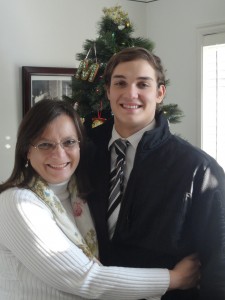A Brazilian woman who emigrated to a foreign country and earned master’s and doctorate degrees while raising four children is now living her dream of teaching at BYU.
Portuguese professor Vanessa Fitzgibbon has proven that obstacles and challenges can be overcome with a positive attitude, passion and strength. Known for being a hard worker, Fitzgibbon is a respected professor and the author of a textbook for BYU Portuguese classes.

As a child growing up in Brazil, Fitzgibbon cut some pictures of “one of the most beautiful places” she ever saw from a magazine. The magazine was entirely in English, and no one in her house knew where it came from.
Years later, American LDS missionaries told her the magazine was a “New Era” other missionaries had given her family before being arrested as spies by the government. The missionaries told her the place was Brigham Young University.
Fitzgibbon joined the church and moved with her family from Santo Andre to Sao Jose dos Campos as a teenager. Her initial plans to study architecture or a physics-related major fell through after she moved because the local university did not offer those courses. She ended up choosing her second favorite subject — Portuguese.
“I studied literature, grammar, history, linguistics and everything because in Brazil you study your major for four years, so you study everything,” Fitzgibbon said. “Different from here, because you take two years studying general education classes and two years in the major itself.”
Fitzgibbon said she always loved to read and analyze the context of the literature pieces she read. Full bookshelves in her office show her passion for literature has not died.
After her graduation and marriage, Fitzgibbons’ then-husband, a BYU graduate, suggested their family emigrate to the United States to escape a difficult time for the Brazilian economy during which hundreds of businesses fell apart.
She came to Utah in 1992 and started her master’s degree in Luso-Brazilian literature at BYU two years later. Following her divorce in 2001 she moved to Wisconsin with her children to get her doctorate in Luso-Brazilian literature from the University of Wisconsin-Madison and stayed until 2006, when she began teaching at BYU.

Although she has made many of her educational dreams come true, raising four children alone in a different country and culture was a challenge.
“It’s difficult to be far from family,” Fitzgibbon said. “I think this is the greatest challenge because the culture is very different and individualistic.”
Despite the challenges, teaching at BYU has become one of her greatest passions.
“It’s a privilege to teach at BYU because in here there is a great concern about the students’ well-being,” Fitzgibbon said. “We as professors need to encourage the students to serve and to be a good example.”
Her fellow Portuguese professor, Rex Nielson, said Fitzgibbon stands out.
“She has a tremendous knowledge of Brazilian culture, history, politics, literature and a great rapport with students,” Nielson said. “That is something that really distinguishes her, especially her rapport with students.”
Her students recognize her genuine concern for them. Erik Pinho, a sophomore studying chemistry, said he felt Fitzgibbon really cared about all of them.
“I could see she wanted us to really learn, rather than only getting a good grade,” Pinho said. “And she wants to make sure we learn about culture, even when taking a grammar class.”
Nielson said Fitzgibbon focuses on teaching culture to help students better understand Brazilians.
“She has great passion for teaching as well as for helping her students understand a culture that they, in the majority, have grown to love through missionary service and want to know more about,” Nielson said.




